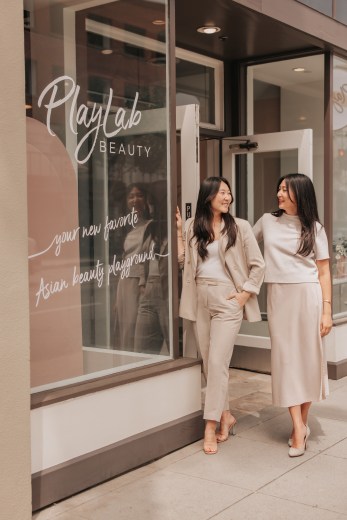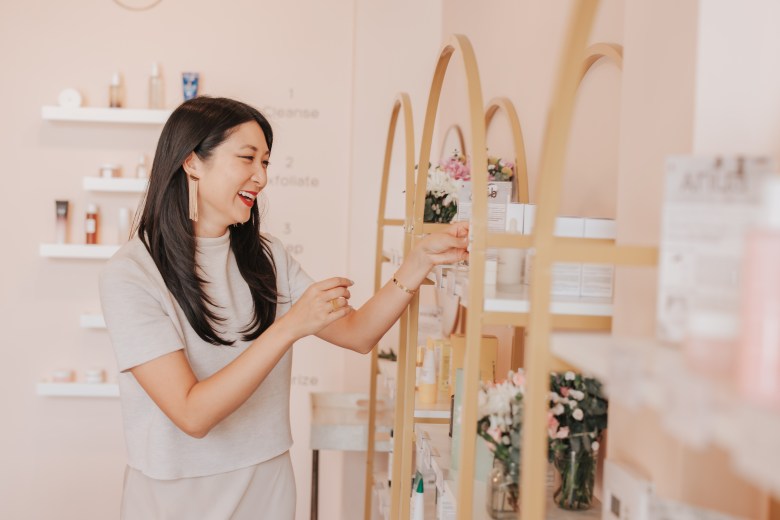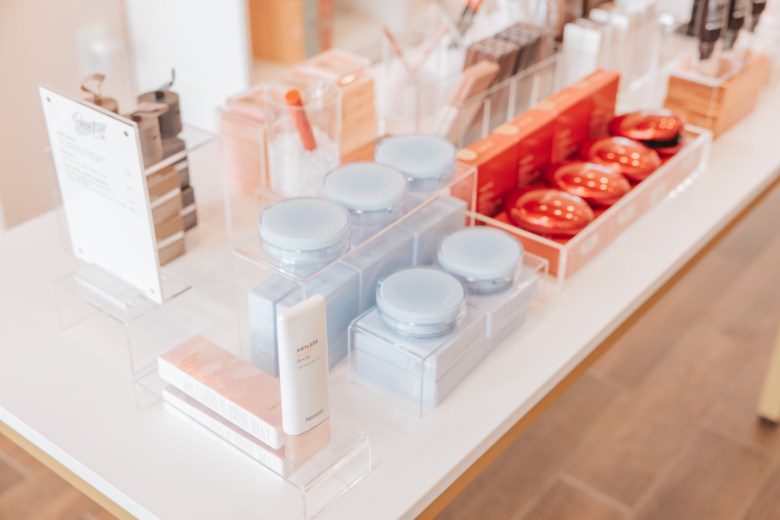In an era when almost all trending K-beauty and J-beauty products can be purchased online, obstacles like e-tailer trust, product education and lengthy shipping times can dissuade many curious shoppers. PlayLab Beauty offers an in-person shopping alternative with its new boutique concept.
The new brick-and-mortar store, which opened on Wednesday in L.A.’s busy Old Town Pasadena neighborhood, offers shoppers the opposite of scouring the internet for the latest lip stain or barrier cream.

Instead, consumers will find expertly curated color cosmetics and skin care from South Korean, Japanese and Chinese brands, as well as international founders inspired by the trends, products and innovations found in the Asian beauty market. Products are arranged by category. The store also offers large tables of testers and mirrors, a sheet mask wall and various inviting displays of products to hold, swipe, layer and apply.
“I didn’t want to launch this online. The whole value proposition is [for consumers] to come experiment, play with products and let us show you,” founder Vanessa Nabhani told Glossy. “We want to put the best of the best out there to give people the confidence that somebody has done their due diligence [so they don’t have to].”
Within this approachable take on Asian beauty, the PlayLab Beauty team has rebuffed the classic 12-step routine made famous during the Korean wave of the aughts. In its place, it recommends to shoppers a streamlined, five-step routine for morning and evening. Nothing in the store is currently priced above $40, and being just a few doors down from Sephora and between Anthropologie and Alo, the location is known for its foot traffic.
Nabhani told Glossy she’s been thinking about this concept for years, but it was only during a recent family trip to Taiwan — her first time visiting where her family is from in 11 years — that she finally decided to take the leap. She bootstrapped the endeavor and quickly brought on fellow industry heavyweight Jeanha Joo as a business partner.
“We want to demystify what these Asian products are because their labels are not in English [and even if you read the language] they don’t explain anything,” Joo told Glossy. “[Shoppers] need help to understand, ‘What is this product? What is this brand? What does this do? What’s in it for me?’”

Nabhani and Joo met in 2013 on the founding retail team of Violet Grey where Nabhani served as director of business development and Joo was the company’s senior buyer. Nabhani has since worked in corporate growth strategy for Ernst & Young’s EY-Parthenon and as director of account management at Farfetch. Since leaving Violet Grey in 2015, Joo has worked in e-commerce at Smashbox Cosmetics, Solly Baby and Skin PS Brands, which owns Dr. Pimple Popper and SLMD Skincare.
The 650-square-foot PlayLab Beauty space was formerly occupied for two decades by an indie beauty business called The Soap Kitchen, which has since moved to an e-comm-exclusive model. Nabhani oversaw the renovation in just a few weeks. Creative and branding was done by Nabhani’s cousin and the store is being staffed by people within her network. PlayLab Beauty is launching without PR or marketing, relying purely on Nabhani and Joo’s network.
Nabhani hand-picked every product in the store and primarily worked with distributors for stock. The store launched with more than 30 brands, many of which are well-known on TikTok and Instagram. South Korean offerings include skin-care brands like Round Lab, COSRX and Beauty of Joseon, as well as color cosmetics from 3CE, Etude and Innisfree. The store is launching with two Japanese brands: Hada Labo skin care and Kate cosmetics.

The first Chinese brand available is Judydoll, a color cosmetics line that ranks among top brands on China’s social app Douyin, the equivalent to TikTok that’s also owned by parent company ByteDance.
American brand Six Gldn, which leverages traditional Korean herbal medicine, is the first U.S. brand sold. The boutique will also feature products made for kids. That will include smaller-sized sheet masks and cushion compacts filled with sunscreen from South Korea’s Puttisu, as well as offerings from Australian brand No Nasties, which sells play makeup for kids ages 3 and up.
Every Saturday, the team will host event-like demonstrations targeting different buzzy topics, such as a “glass skin lab” or “gua sha lab,” where curious consumers can learn the techniques, tips and tricks that power viral trends.
According to the team, the store’s main competitors are the beauty boutiques in L.A.’s Koreatown or nearby San Gabriel Valley, where large populations of Asian Americans reside. Since she speaks Korean, Joo often plays travel guide for friends at these shops, which she describes as jam-packed with products and overwhelming, especially if you don’t speak the language.
Nabhani hopes to be successful enough to expand to L.A.’s Westside next, but she doesn’t plan to move into e-commerce anytime soon. Instead, she’ll remain focused on facilitating a highly curated, welcoming place for discovering products in person.
“The world does not need another product,” Nabhani said. “What the world needs is help paring it down and figuring out what’s best.”




